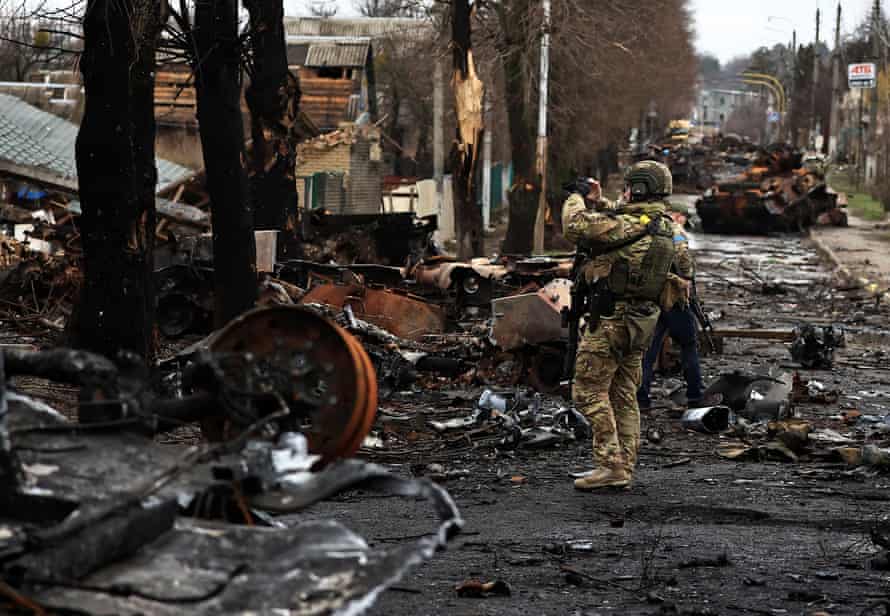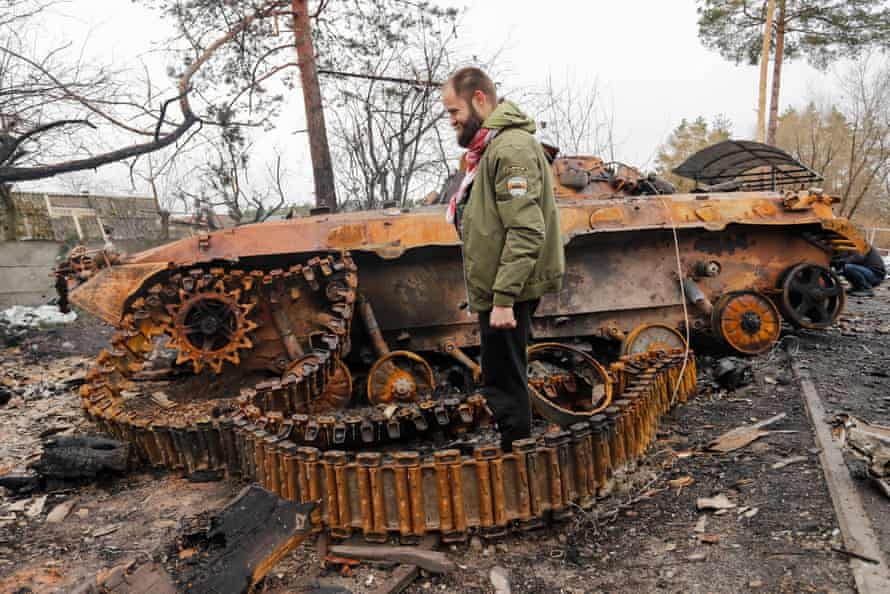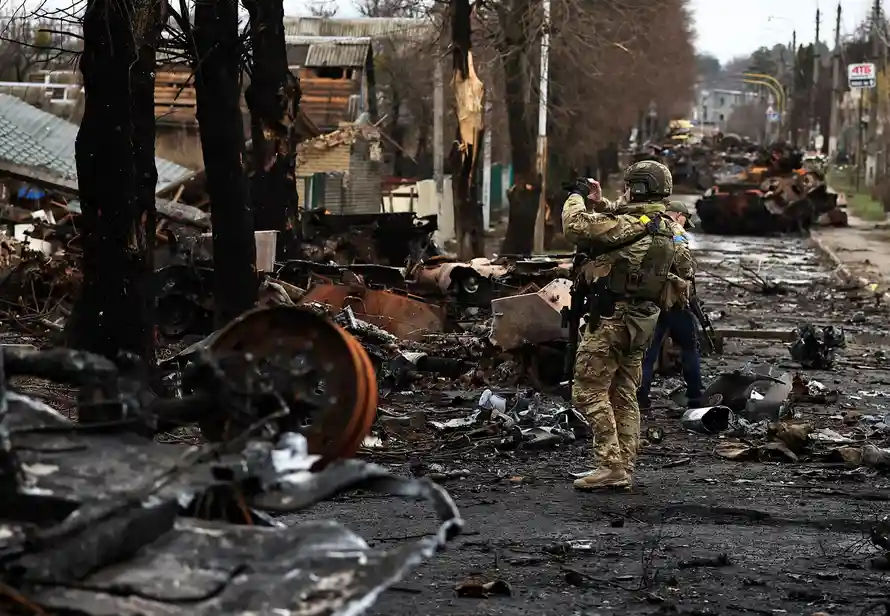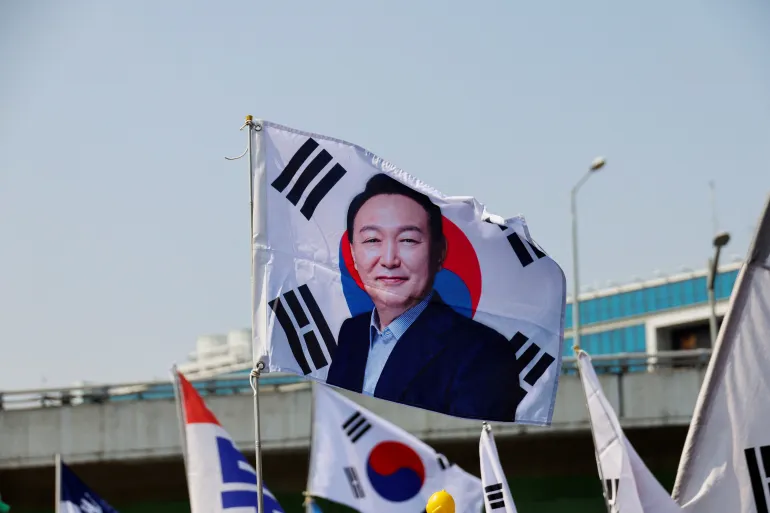Ukrainian forces liberating the town near Kyiv find streets littered with corpses of civilians and burned-out Russian tanks
The retreat of Russian forces around Kyiv has left horrifying evidence of atrocities against civilians littered across the region’s suburbs and towns, turned into hellish war zones by Vladimir Putin’s invasion.
As Ukrainian armoured columns rolled into Bucha, a town north-west of the capital, they found streets blocked by burned-out Russian tanks and military vehicles, and strewn with the bodies of civilians whom locals said had been killed by the invading forces without provocation.
Photographs from the town showed a scene of devastation, with hunks of charred and destroyed tanks and armoured vehicles lined up along one street, along with dead bodies.

Reporters from Agence France-Presse saw at least 20 bodies, all in civilian clothing, strewn across a single street in Bucha, and the body of a missing Ukrainian photographer, Maksim Levin, was discovered in a nearby village.
Three of them were tangled up in bicycles after taking their final ride, while others had fallen next to bullet-ridden and crushed cars, AFP reported.
One had his hands tied behind his back with a white cloth, and his Ukrainian passport left open beside his corpse, said journalists who accessed the ravaged town.
“All these people were shot,” Bucha’s mayor Anatoly Fedoruk told AFP, adding that 280 other bodies had been buried in mass graves in the town. “These are the consequences of Russian occupation.”
Ukrainian soldiers in Bucha, who were welcomed warmly by residents of the town, attached cables to the bodies and pulled them off the street for fear they may be booby-trapped.
Soldiers also cleared barricades and inspected suspicious objects, placing red rags on remnants of unexploded ordnance to draw attention to the possibility of explosions.
As the town was liberated, one woman, Halyna Tovkach, 55, told the Guardian that she was searching for the body of her husband, Oleg, 62. He was killed by Russian soldiers along with their neighbours, two young boys and their mother, as they tried to escape the town on 5 March. “It is a war crime,” said Tovkach’s son.
Also allegedly among the civilians killed by the Russians was Olha Sukhenko, the head of the village of Motyzhin east of Kyiv, and her entire family.

An in another accusation of war crimes, Russian troops allegedly used children as “human shields” while regrouping.
Ukraine’s attorney general is gathering a dossier of claims about the Russian use of local children to avoid fire when in retreat from around Ukraine’s capital and elsewhere. Coaches of children were said to have been placed in front of tanks in the village of Novyi Bykiv, close to the encircled city of Chernihiv, 100 miles north of Kyiv.
Britain’s foreign secretary, Liz Truss, said she was “appalled by atrocities in Bucha and other towns in Ukraine”.
Ukraine and its western allies reported mounting evidence of Russia withdrawing its forces from around Kyiv and building its troop strength in eastern Ukraine. The visible shift did not mean the country faced a reprieve from more than five weeks of war or that the more than 4 million refugees who have fled Ukraine will return soon.
Ukraine’s president, Volodymyr Zelenskiy, again repeated his warning that Russian troops want to capture the Donbas and the south of Ukraine. In his nightly video address on Saturday, Zelenskiy said “we are aware that the enemy has reserves to increase pressure in the east”.

He nevertheless promised to take the fight to the Russians in the Donbas and as they retreated from the Kyiv region.
“We are strengthening our defences in the eastern direction and in Donbas,” Zelenskiy said. “What is the goal of Russian troops? They want to capture both the Donbas and the south of Ukraine.”
But Zelenskiy complained that the “global security architecture has failed” and that Ukraine has “not yet received enough modern western anti-missile systems” from its western allies, nor given aircraft. He added: “Every Russian missile that hits our cities, and every bomb dropped on our people, on our children, only adds black paint to the history that will describe everyone on whom the decision depended.”
Sources reported a series of explosions in the southern port city of Odesa on Sunday morning.
“Odesa was attacked from the air. Some missiles were shot down by air defense,” the city council said in a brief statement on the Telegram messaging app. It said fires were reported in some areas but gave no indication what was hit in the attack.
Ukraine’s peace negotiator, David Arakhamia, reportedly said that Russia “verbally” accepts the Ukrainian position on peace talks, AFP reported, except for the issue of Crimea. Moscow had also agreed that a referendum on the neutral status of Ukraine “will be the only way out of this situation”.
Arakhamia also told Ukrainian television channels that any meeting between Zelenskiy and the Russian president, Vladimir Putin, would “with a high probability” take place in Turkey.
Elsewhere, Poland’s deputy prime minister has accused France and Germany of being too close to Russia in an interview published on Sunday, as he condemned Berlin’s behaviour towards Moscow before the invasion of Ukraine.
“Germany, like France, has a strong bias in Moscow’s favour,” Jarosław Kaczyński, who is also leader of the ruling Law and Justice (PiS) party, told German daily Die Welt in an interview.
Kaczyński saved his strongest words for Berlin, saying that for years the German government did not want to see what Russia was doing under the leadership of Putin “and we see the result today”. He added that “Poland is not pleased with Germany’s role in Europe”.
… we have a small favour to ask. Millions are turning to the Guardian for open, independent, quality news every day, and readers in 180 countries around the world now support us financially.
We believe everyone deserves access to information that’s grounded in science and truth, and analysis rooted in authority and integrity. That’s why we made a different choice: to keep our reporting open for all readers, regardless of where they live or what they can afford to pay. This means more people can be better informed, united, and inspired to take meaningful action.
In these perilous times, a truth-seeking global news organization like the Guardian is essential. We have no shareholders or billionaire owner, meaning our journalism is free from commercial and political influence – this makes us different. When it’s never been more important, our independence allows us to fearlessly investigate, challenge and expose those in power. Support the Guardian from as little as $1 – it only takes a minute. If you can, please consider supporting us with a regular amount each month. Thank you.







